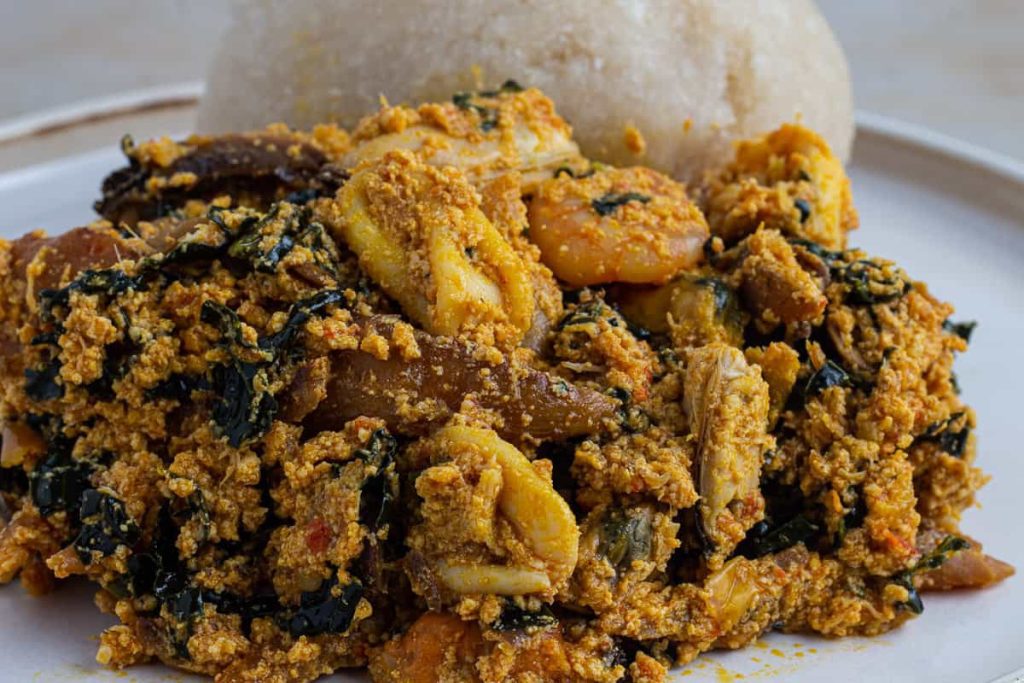Introduction
Egusi soup is more than just food, it’s a cultural treasure and comfort dish loved across Nigeria and West Africa. Made from ground melon seeds (egusi), palm oil, vegetables, and proteins, this hearty soup is usually paired with swallows like pounded yam, eba, or other ‘swallows’. Whether you’re enjoying it at a wedding, family gathering, or lunch, egusi soup always brings warmth and satisfaction. Sit back and relax while we cover everything you need to know about egusi soup, its cultural significance, regional variations, nutritional value, cooking methods, and even a simple recipe you can try at home.
What is egusi soup?
Egusi soup is a traditional soup that is prepared with ground melon seeds, palm oil, vegetables, meat, and fish. The seeds are packed with protein and healthy fats, making the dish both delicious and nutritious. It’s one of the most popular soups cherished for its unique flavour and versatility.
Cultural significance of egusi soup
Across Nigeria, egusi soup is not just a meal, it’s a symbol of tradition and celebration. Among the Yoruba people, it’s often enriched with locust beans (iru). The Igbo version frequently includes bitterleaf, while Edo State’s version may have uziza leaves and extra pepper.
Ingredients used in egusi soup include:
Ground egusi (melon seeds)
– Palm oil
– Assorted meats (goat meat, beef, chicken)
– Stockfish or dried fish
– Leafy greens like ugu (pumpkin leaves), spinach, or bitterleaf
– Onions, tomatoes, peppers
– Seasonings like crayfish, salt, and bouillon cubes
Variations of egusi soup
1. Fried egusi soup – ground melon seeds fried in palm oil for richer flavour
2. Lumpy egusi soup – egusi paste added in dollops for extra texture
3. Egusi with okra – a blend of egusi and okra for thickness
4. Vegetarian egusi soup – mushrooms replace proteins for a plant-based twist

Nutritional value of egusi soup:
Egusi soup is nutritious, offering protein, healthy fats, vitamins, and minerals. It’s filling, energising, and perfect for both daily meals and special occasions. Egusi soup is as nutritious as it is tasty with these points:
– Protein-rich – Egusi seeds contain plant protein, making them great for muscle health
– Healthy fats – The seeds and palm oil provide good fats for energy
– Vitamins and minerals – Leafy greens offer vitamins A, C, and iron
– Filling and energising – When paired with swallows, it provides long-lasting satiety
This makes egusi soup perfect for both everyday meals and festive occasions Ingredients include:
·2 cups ground egusi
·1 cup palm oil
·2 cups assorted meats
·1 cup stockfish or dried fish
·2 tbsp crayfish
·2 cups pumpkin leaves/spinach/bitterleaf
·2 scotch bonnets
·2 tomatoes plus one bell pepper
·1 onion
·4 cups stock or water
·Salt and seasoning cubes
Steps
1. Season and cook meats
2. Heat palm oil, sauté onions
3. Add blended peppers and tomatoes, fry until oil separates
4. Stir in ground egusi, fry lightly, add stock gradually
5. Add meats, stockfish, crayfish
6. Season and simmer
7. Add vegetables and cook for three minutes
8. Serve with pounded yam, eba, or amala
Serving suggestions
Best served with ‘swallows’ like pounded yam, eba, amala, semo, or wheat. It can also be paired with rice, yam, or plantains. For parties, combine with jollof rice, fried rice, or suya.
Frequently asked questions about egusi soup
Q: What is the most popular Nigerian food?
A: Jollof rice globally, but egusi soup is the most loved soup locally
Q: Is Nigerian food spicy?
A: Yes, often made with scotch bonnet peppers
Q: What do you eat with egusi soup?
A: Swallows like pounded yam, eba, or amala
Q: Is egusi soup healthy?
A: Yes, it’s rich in protein, fiber, and healthy fats
Q: Can I make egusi soup without palm oil?
A: Yes, substitute with vegetable oil, but flavour changes
In conclusion, egusi soup is a nutrient-rich, flavourful, and deeply cultural dish representing Nigerian cuisine. It’s versatile, customisable, and a must-try for anyone exploring West African food.

